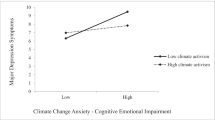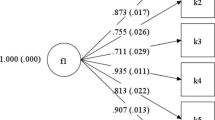Abstract
The focus of this research was the proposal that depressive symptomatology results from the interaction of an individual's dysfunctional attitudes with stressful life events that impinge on those attitudes. In Study 1, subjects completed the Beck Depression Inventory (BDI), the Dysfunctional Attitudes Scale (DAS), and the Dysfunctional Attitudes Scale-Contractual Conditions (DAS-CC). The DAS measures dysfunctional attitudes presumed to be characteristic of individuals cognitively vulnerable to depression. The DAS-CC is a modified version of the DAS, designed to measure the presence or absence of specific life events that might impinge directly on an individual's dysfunctional attitudes. Consistent with the proposed interactive model, the results from Study 1 indicated that the combination of high DAS-CC and high DAS scores successfully predicted high depression scores. This significant life events by vulnerability interaction was also predicted and found in Study 2, where subjects completed a different measure of stressful life events (the Life Experiences Survey), along with the DAS and BDI. Additional findings from the two studies revealed that those individuals scoring high on the DAS displayed more frequent thoughts about past, present, or expected future life difficulties than those individuals scoring low on this measure, and that they also rated these events as having a greater degree of importance and emotional impact. Furthermore, individuals with high DAS scores displayed increased levels of perceived stress, relative to individuals with low DAS scores. These findings were discussed in terms of a vulnerability model of depression that highlights the role of dysfunctional attitudes and appraisals in enhancing stress levels.
Similar content being viewed by others
References
Beck, A. T., & Beamesderfer, A. (1974). Assessment of depression: The depression inventory. In P. Pichot (Ed.),Psychological measurements in psychopharmacology and modern pharamacopsychiatry. Basel, Switzerland: Karger.
Beck, A. T., Rush, A. J., Shaw, B. F., & Emery, G. (1979).Cognitive therapy of depression. New York: Guilford Press.
Beck, A. T., Ward, C. H., Mendelson, M., Mock, J., & Erbaugh, J. (1961). An inventory for measuring depression.Archives of General Psychiatry, 4 561–571.
Billings, A. G., Cronkite, R. C., & Moos, R. H. (1983). Social-environmental factors in unipolar depression: Comparisons of depressed patients and nondepressed controls.Journal of Abnormal Psychology, 92 119–134.
Bumberry, W., Oliver, J. M., & McClure, J. N. (1978). Validation of the Beck Depression Inventory in a university population using psychiatric estimates as the criterion.Journal of Consulting and Clinical Psychology, 46 150–155.
Clayton, P. J., Halikas, J. A., & Maurice, W. L. (1972). The depression of widowhood.British Journal of Psychiatry, 120 71–78.
Cohen, S., Kamarck, T., & Mermelstein, R. (1983). A global measure of perceived stress.Journal of Health and Social Behavior, 24 385–396.
Dobson, K. S., & Breiter, H. J. (1983). Cognitive assessment of depression: Reliability and validity of these measures.Journal of Abnormal Psychology, 92 107–109.
Eaves, G., & Rush, A. J. (1984). Cognitive patterns in symptomatic and remitted unipolar major depression.Journal of Abnormal Psychology, 93 31–40.
Kanner, A. D., Coyne, J. C., Schaefer, C., & Lazarus, R. S. (1981). Comparison of two modes of stress measurement: Daily hassles and uplifts versus major life events.Journal of Behavioral Medicine, 4 1–39.
Kuiper, N. A., & Olinger, L. J. (1986). Dysfunctional attitudes and a self-worth contingency model of depression. In P. C. Kendall (Ed.).Advances in cognitive-behavioral research and therapy (Vol. 5, pp. 115–142). New York: Academic Press.
Kuiper, N. A., Olinger, L. J., MacDonald, M. R., & Shaw, B. F. (1985). Self-schema processing of depressed and nondepressed content: The effects of vulnerability to depression.Social Cognition, 3 77–93.
Monroe, S. M. (1982). Assessment of life events: Retrospective vs. concurrent strategies.Archives of General Psychiatry, 39 606–610.
Oliver, J. M., & Baumgart, E. P. (1985). The Dysfunctional Attitude Scale: Psychometric properties and relation to depression in an unselected adult population.Cognitive Therapy and Research, 9 161–167.
Sarason, I. G., Johnson, J. H., & Siegel, J. M. (1978). Assessing the impact of life changes: Development of the life experiences survey.Journal of Consulting and Clinical Psychology, 46 932–946.
Smith, T. W., Boaz, T. L., & Denney, D. R. (1984). Endorsement of irrational beliefs as a moderator of the effects of stressful life events.Cognitive Therapy and Research, 8 363–370.
Weissman, A. N. (1980).Assessing depressogenic attitudes: A validation study. Paper presented at the 51st Annual Meeting of the Eastern Psychological Association, Hartford, Connecticut.
Weissman, A. N., & Beck, A. T. (1978).Development and validation of the Dysfunctional Attitudes Scale. Paper presented at the American Educational Research Association Annual Convention, Toronto, Canada.
Author information
Authors and Affiliations
Rights and permissions
About this article
Cite this article
Olinger, L.J., Kuiper, N.A. & Shaw, B.F. Dysfunctional attitudes and stressful life events: An interactive model of depression. Cogn Ther Res 11, 25–40 (1987). https://doi.org/10.1007/BF01183130
Issue Date:
DOI: https://doi.org/10.1007/BF01183130




